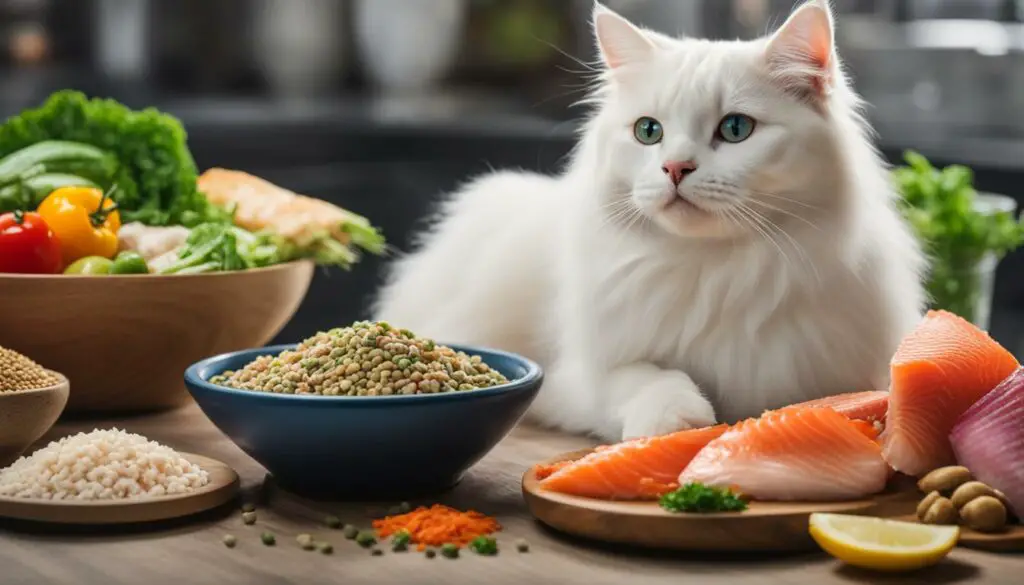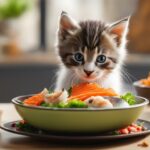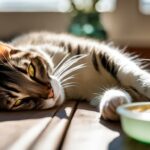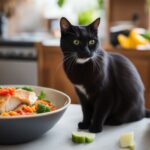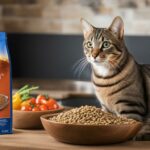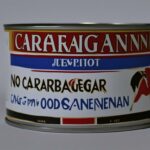To ensure your feline friend remains happy and healthy, it’s crucial to provide them with the right food. There are hundreds of pet food brands available, making it challenging to find the best cat food. The ideal food should meet their nutritional requirements, support digestive health, and help them maintain a healthy weight.
Key Takeaways:
- Finding the best cat food can be a challenge due to the wide variety of options available.
- It’s important to choose cat food that meets your cat’s nutritional requirements.
- Digestive health and weight management are key considerations when selecting cat food.
- Consulting with your veterinarian can help you make an informed decision.
- Reputable brands like Hill’s Science Diet, Royal Canin, Purina Pro Plan, and Blue Buffalo are recommended by veterinarians.
Cats’ Specific Nutritional Requirements
As doting cat owners, we must understand the specific nutritional requirements of our feline friends to keep them healthy and thriving. Cats are obligate carnivores, meaning their bodies are designed to thrive on a diet primarily consisting of animal-based protein.
Taurine, vitamin A, arginine, and arachidonic acid are vital nutrients that cats require for optimum health. Taurine, for instance, is an amino acid that cats cannot produce themselves and must obtain from their diet. It plays a crucial role in maintaining healthy vision, heart function, and reproductive health in cats.
“Cats have unique nutritional needs as strict carnivores. They require higher protein levels and specific nutrients to support their overall health and well-being.”
Vitamin A, arginine, and arachidonic acid are other essential nutrients that cats must obtain from their diet. Vitamin A is vital for maintaining healthy skin, coat, and eyesight, while arginine and arachidonic acid support various physiological functions, including kidney health, immune function, and reproductive health.
To ensure that your cat receives these essential nutrients, it’s important to choose a high-quality cat food that meets their specific nutritional requirements. Look for cat food brands that prioritize animal-based protein sources and include these essential nutrients in their formulations.
Table: Essential Nutrients for Cats
| Nutrient | Function | Food Sources |
|---|---|---|
| Taurine | Supports vision, heart function, and reproductive health | Meat, fish |
| Vitamin A | Maintains healthy skin, coat, and eyesight | Liver, fish oil, eggs |
| Arginine | Supports kidney health, immune function, and reproductive health | Poultry, meat, fish |
| Arachidonic Acid | Plays a role in inflammation, immunity, and reproduction | Poultry, pork fat, fish oil |
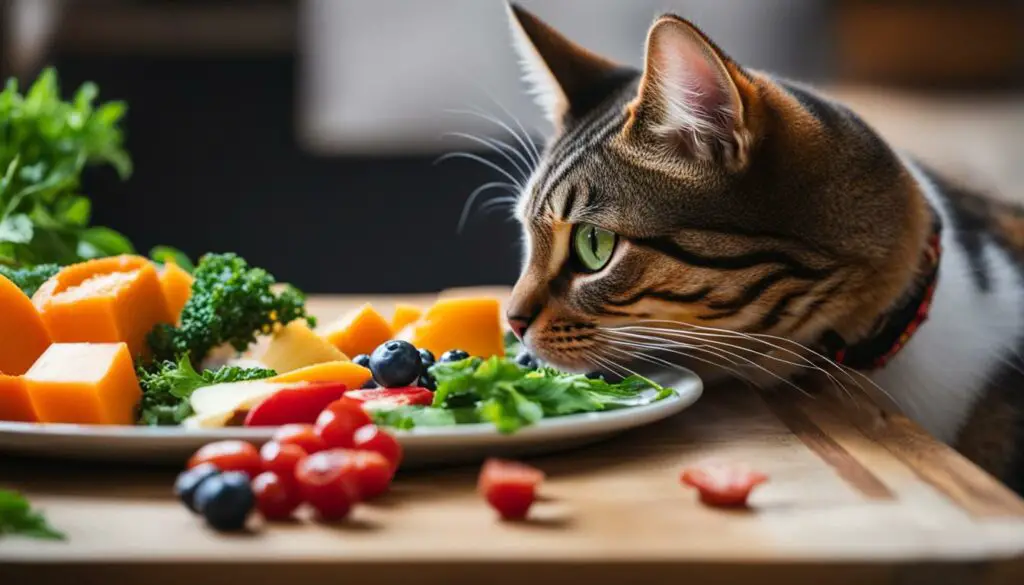
By understanding and meeting their specific nutritional needs, we can help our beloved cats lead long, healthy, and fulfilling lives. Remember to consult with your veterinarian to ensure you provide the best cat food that meets these requirements and supports your cat’s overall well-being.
AAFCO Nutritional Adequacy Statement
When selecting cat food, it’s important to look for the AAFCO Nutritional Adequacy Statement on the packaging. This statement ensures that the food provides complete and balanced nutrition for your cat’s specific life stage. The Association of American Feed Control Officials (AAFCO) sets the nutritional standards that cat food should meet. By choosing a cat food with this statement, you can have confidence that it meets the necessary requirements for your furry friend’s well-being.
The AAFCO Nutritional Adequacy Statement indicates that the food has undergone feeding trials or has been formulated to meet specific nutrient profiles. Feeding trials involve actual cats consuming the food to ensure it provides all the necessary nutrients for their health. Nutrient profiles, on the other hand, are formulated to meet the specific nutritional needs of cats at different life stages. These profiles take into consideration factors such as age, reproductive status, and activity level.
By choosing cat food with the AAFCO Nutritional Adequacy Statement, you can rest assured that it provides a complete and balanced diet for your feline friend. This statement ensures that the food meets the necessary nutritional requirements and supports your cat’s overall well-being. It’s always recommended to consult with your veterinarian to determine the best cat food options for your cat’s specific needs and life stage.
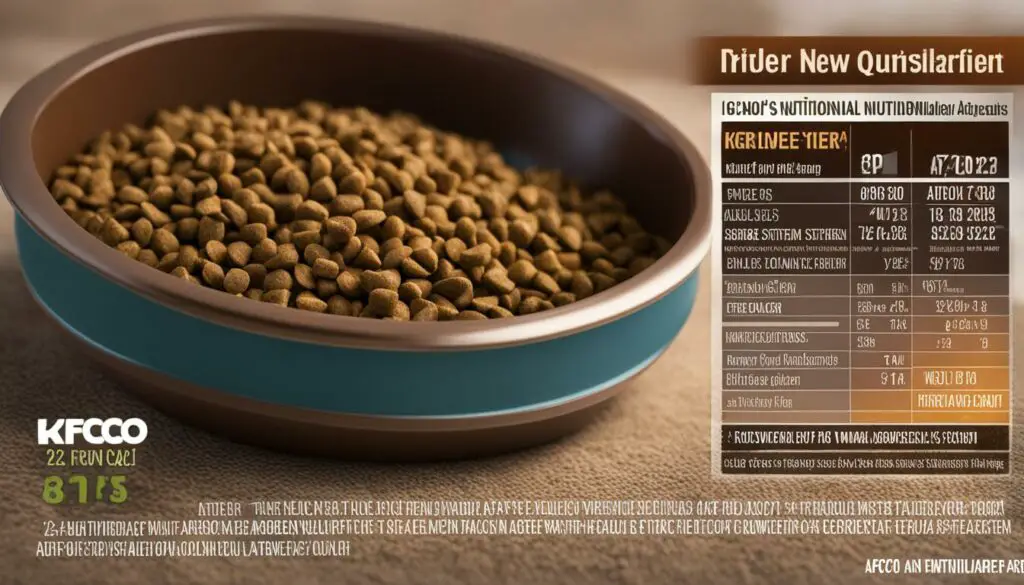
| Nutrient | Life Stage |
|---|---|
| Protein | Growth, reproduction, and maintenance |
| Fat | Growth, reproduction, and maintenance |
| Vitamins | Growth, reproduction, and maintenance |
| Minerals | Growth, reproduction, and maintenance |
| Amino Acids | Growth, reproduction, and maintenance |
| Taurine | All life stages |
| Antioxidants | All life stages |
| Omega-3 fatty acids | All life stages |
Different Types of Cat Food
When it comes to choosing the right cat food for your furry friend, you’ll find that there are two main types available: wet cat food and dry cat food. Each type has its own unique benefits and considerations to keep in mind.
Benefits of Wet Cat Food:
Wet cat food is typically packaged in cans or pouches and contains a higher moisture content compared to dry cat food. This higher moisture content is beneficial for a few reasons:
- Hydration: The increased moisture in wet cat food can help keep your cat well-hydrated, which is especially important for cats who may not drink enough water on their own.
- Urinary Health: The added moisture in wet cat food can help prevent urinary tract issues by promoting healthy urine flow and reducing the risk of crystal formation.
- Palatability: Many cats find wet cat food to be more flavorful and enticing, making it a great option for picky eaters or those with dental issues that make chewing dry food difficult.
Benefits of Dry Cat Food:
Dry cat food, also known as kibble, has its own advantages that may suit your cat’s needs:
- Convenience: Dry cat food is convenient to store and serve. It doesn’t require refrigeration and can be left out for your cat to graze on throughout the day.
- Dental Health: The crunchy texture of dry cat food can help promote dental health by reducing the buildup of plaque and tartar on your cat’s teeth.
- Economical: Dry cat food tends to be more cost-effective compared to wet cat food, making it a budget-friendly option for pet owners.
Ultimately, the choice between wet and dry cat food will depend on your cat’s preferences, dietary needs, and any specific health considerations advised by your veterinarian. Some cat owners may even choose to provide a combination of both wet and dry cat food to provide a well-rounded diet.
| Type of Cat Food | Benefits |
|---|---|
| Wet Cat Food |
|
| Dry Cat Food |
|
Importance of Ingredients in Cat Food
When it comes to choosing the best cat food for your furry friend, it’s essential to pay attention to the ingredients. Cats require animal-based protein, such as chicken or salmon, to meet their nutritional needs. These proteins provide essential nutrients like taurine, which is crucial for their overall health and well-being. When selecting cat food, look for high-quality, named ingredients that clearly specify the protein source.
It’s important to avoid cat foods that contain excessive fillers like corn, wheat, or soy. These ingredients provide little nutritional benefit to cats and may lead to digestive issues or allergies. Instead, opt for cat foods that are free from artificial colors, flavors, and preservatives. These additives can be harmful to your cat’s health and may cause adverse reactions. By choosing cat food with wholesome ingredients and avoiding fillers and artificial additives, you can ensure that your cat is getting the best nutrition possible.
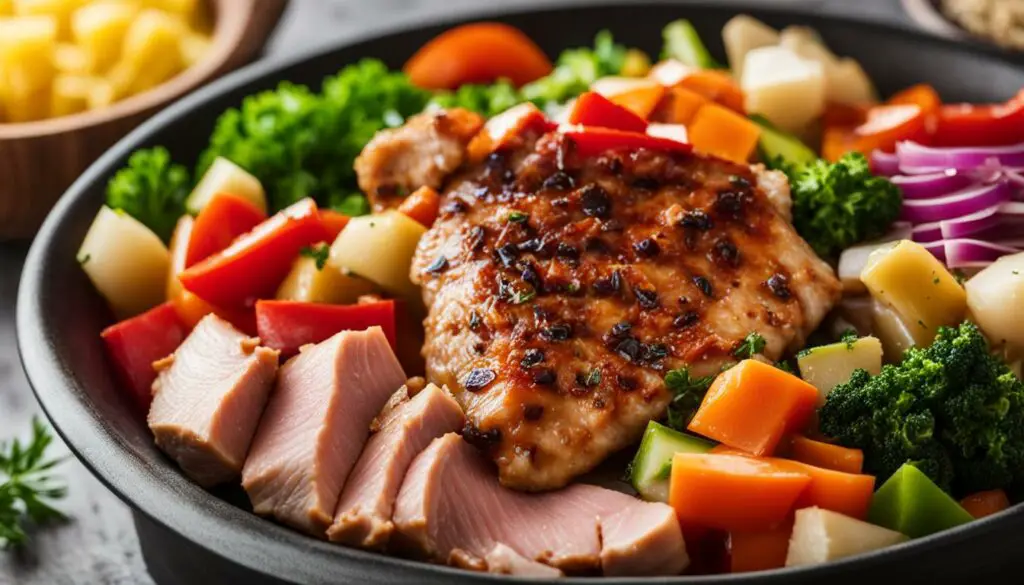
The Importance of Animal-Based Protein
Cats are obligate carnivores, which means they require a diet rich in animal-based protein to thrive. Animal-based proteins provide the necessary amino acids that cats cannot produce on their own. These amino acids are vital for maintaining muscle mass, promoting healthy skin and coat, and supporting a strong immune system.
When reading the ingredients on cat food labels, look for specific protein sources, such as chicken, turkey, or fish, rather than vague terms like “meat by-products.” Named ingredients ensure that you know exactly what your cat is consuming and can help you make informed choices about their diet.
| Ingredients to Look for: | Ingredients to Avoid: |
|---|---|
| Chicken | Corn |
| Turkey | Wheat |
| Fish | Soy |
Choosing cat food with high-quality, named ingredients ensures that your feline friend gets the necessary animal-based protein and avoids fillers that provide little nutritional benefit.
By paying attention to the ingredients in your cat’s food, you can help them maintain optimal health and well-being. Consult with your veterinarian to determine the best cat food options based on your cat’s specific needs and preferences.
Caloric Needs of Cats
Understanding the caloric needs of your cat is essential to ensure they maintain a healthy weight and overall well-being. The number of calories a cat requires can vary based on factors such as age, activity level, and metabolism. It’s important to provide them with the appropriate amount of calories to prevent obesity or malnutrition.
Generally, a house cat with moderate activity levels needs around 60 calories per kilogram per day. This calculation can serve as a starting point for determining your cat’s daily caloric intake. However, it’s crucial to monitor their weight and adjust their calorie intake accordingly. Senior cats may require fewer calories, around 45 calories per kilogram per day, as they have a slower metabolism. On the other hand, active young kittens may need slightly more calories, about 70 calories per kilogram per day.
Outdoor cats tend to have higher energy expenditure due to increased physical activity. If your cat spends a significant amount of time outdoors, it may be necessary to provide them with additional calories to meet their energy requirements. Observing your cat’s body condition and consulting with a veterinarian can help determine the optimal calorie intake for your furry friend.
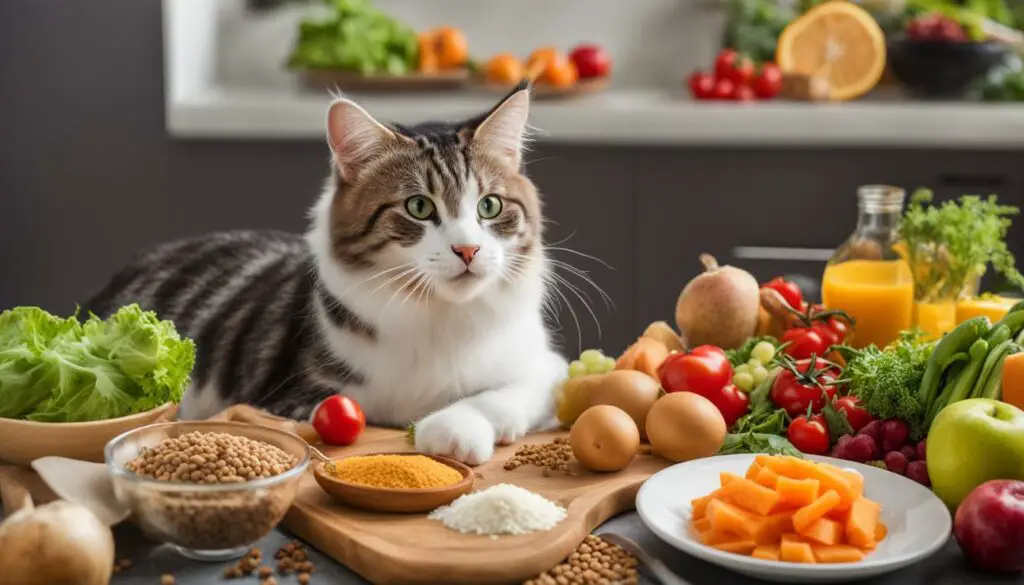
It’s important to note that the caloric needs mentioned above are general guidelines, and individual cats may have specific requirements. Factors such as breed, health conditions, and reproductive status can affect a cat’s metabolic rate and calorie needs. Consulting with your veterinarian is crucial in determining the most suitable caloric intake for your cat and ensuring their nutritional needs are met.
Factors Affecting Cat’s Caloric Needs
The caloric needs of cats can be influenced by various factors, including:
- Age: Kittens and senior cats may have different caloric requirements compared to adult cats.
- Activity level: Active cats require more calories to support their energy expenditure.
- Body condition: Overweight or underweight cats may need adjustments to their calorie intake.
- Health conditions: Certain medical conditions may necessitate a specific diet with modified calories.
- Reproductive status: Pregnant or nursing cats have higher energy needs during these stages.
Understanding and meeting your cat’s caloric needs is crucial for their overall health and well-being. Providing a balanced diet with the appropriate number of calories can help ensure they maintain a healthy weight and enjoy an active, happy life.
Table: Caloric Needs of Cats
| Cat’s Life Stage | Calories per Kilogram per Day |
|---|---|
| House Cat (moderate activity) | 60 |
| Senior Cat | 45 |
| Active Young Kitten | 70 |
Reputable Cat Food Brands Recommended by Vets
When it comes to choosing the best cat food for your furry friend, it’s essential to consider reputable brands that come highly recommended by veterinarians. These brands have a proven track record of providing high-quality nutrition and meeting the specific dietary needs of cats. Some of the top vet-recommended cat food brands include Hill’s Science Diet, Royal Canin, Purina Pro Plan, and Blue Buffalo.
These brands have dedicated research teams that work tirelessly to develop formulas that are backed by scientific research and meet the nutritional requirements of cats. They use high-quality ingredients and have a range of options to cater to different life stages and specific health needs. Whether your cat needs a specialized diet for weight management, urinary tract health, or sensitive stomachs, these brands have you covered.
“Hill’s Science Diet is a brand that I frequently recommend to my clients. They have a wide range of formulas that address various health concerns and are formulated to provide complete and balanced nutrition. Royal Canin is another trusted brand that offers breed-specific formulas, ensuring that each cat gets the nutrients they need based on their breed’s characteristics. Purina Pro Plan and Blue Buffalo also have excellent options for cats with specific dietary needs.”
The Importance of Veterinary Consultation
While these brands are highly regarded, it’s important to consult with your veterinarian before making any changes to your cat’s diet. Your veterinarian can assess your cat’s specific needs and recommend the best brand and formula for their health and well-being. They can take into account factors such as age, weight, activity level, and any underlying health conditions to provide personalized dietary recommendations.
By working closely with your veterinarian, you can ensure that you are choosing the best cat food that will support your cat’s overall health and happiness. Your veterinarian is a trusted source of information and can provide guidance on proper feeding practices and answer any questions or concerns you may have.
| Reputable Cat Food Brands Recommended by Vets |
|---|
| Hill’s Science Diet |
| Royal Canin |
| Purina Pro Plan |
| Blue Buffalo |
Best Cat Food for Indoor Cats
As pet owners, we want the best for our furry friends, especially when it comes to their nutrition. For indoor cats, choosing the right cat food is essential for their overall health and well-being. Indoor cats have specific needs, including weight management and hairball control, that can be addressed with the right diet.
Weight management: Indoor cats are often less active compared to their outdoor counterparts, which can lead to weight gain and obesity. To manage their weight, it’s important to choose cat food that is specially formulated for indoor cats. These formulas are typically lower in calories and fat, helping to maintain a healthy weight for your indoor feline companion.
Hairball control: Indoor cats tend to groom themselves more frequently, leading to an increased risk of hairballs. Cat food designed for hairball control contains specific ingredients such as natural fibers that help reduce the formation of hairballs and promote healthy digestion. Look for cat food that includes ingredients like psyllium husk or beet pulp to aid in hairball prevention.
| Cat Food Brand | Features |
|---|---|
| Blue Buffalo Tastefuls Indoor | Formulated with high-quality protein, tailored for indoor cats, and supports weight management. |
| IAMS ProActive Health Indoor Weight Control & Hairball Care | Helps maintain a healthy weight and contains a unique fiber blend for hairball control. |
| Purina ONE +Plus Indoor Advantage | Specifically formulated for indoor cats and provides balanced nutrition for weight management. |
Choosing the right cat food for your indoor cat is crucial for their overall health and well-being. Consider their specific needs, such as weight management and hairball control, when selecting the best cat food. Brands like Blue Buffalo, IAMS, and Purina offer specialized formulas designed to meet the needs of indoor cats. Consult with your veterinarian to determine the most suitable cat food brand and formula for your beloved indoor feline companion.
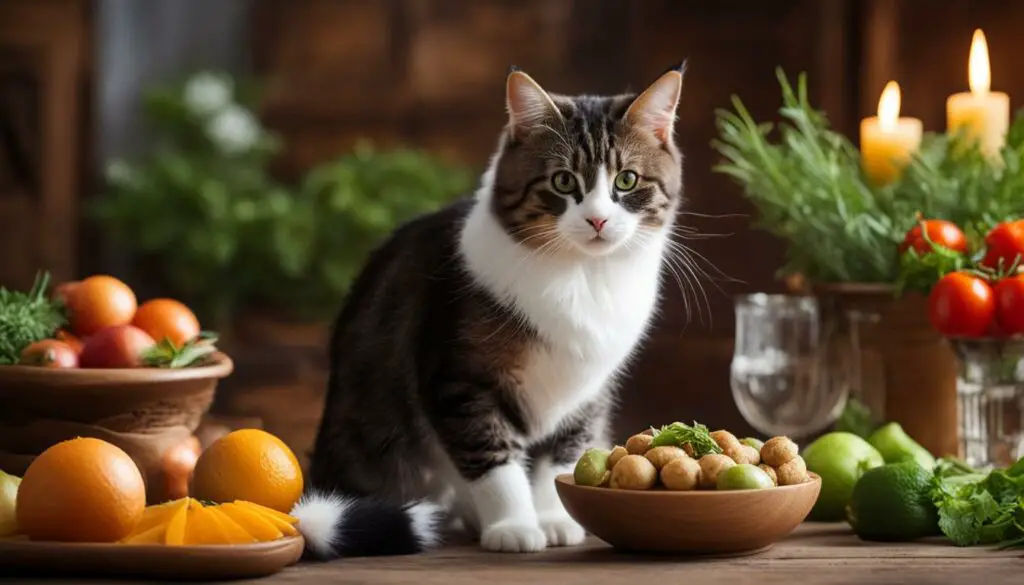
Grain-Free Cat Food Controversy
The debate surrounding grain-free cat food has been ongoing, with concerns raised about a potential link to heart disease in some cats. While many pet owners have embraced grain-free diets for their cats, recent studies and reports have highlighted a possible connection between these diets and an increased risk of dilated cardiomyopathy (DCM) in certain cats.
DCM is a serious disease that affects the heart muscle, leading to enlargement and reduced function. It can result in symptoms such as fatigue, coughing, difficulty breathing, and even sudden death. The concern with grain-free cat food stems from the fact that some of these diets substitute grains with ingredients like peas, lentils, and potatoes, which may interfere with the absorption of taurine, an essential amino acid for cats.
Taurine deficiency can lead to a variety of health problems, including DCM. While the exact mechanism of how grain-free diets may contribute to DCM is not fully understood, this potential link has prompted further research and scrutiny. It is important to note that not all cats on grain-free diets will develop heart disease, and many cats can thrive on these diets. However, the potential risk should be considered, especially for breeds that are predisposed to heart disease or cats with preexisting cardiac conditions.
| Key Points: |
|---|
| • Grain-free cat food has been associated with a potential increased risk of dilated cardiomyopathy (DCM) in some cats. |
| • The substitution of grains with ingredients like peas, lentils, and potatoes in these diets may interfere with taurine absorption, leading to taurine deficiency. |
| • Taurine deficiency can result in heart disease, including DCM. |
If you are considering a grain-free diet for your cat, it is essential to consult with your veterinarian. They can evaluate your cat’s individual needs and provide guidance on the most appropriate diet based on their health, breed, and lifestyle. Your veterinarian may recommend alternative diets that meet your cat’s nutritional requirements without the potential risks associated with grain-free options.
Ultimately, the decision is a personal one, and it is important to weigh the potential benefits and risks of any dietary choice for your feline companion. Regular veterinary check-ups and open communication with your veterinarian are vital to ensure your cat’s overall well-being and help you make informed decisions regarding their nutrition.
Best Cat Food Brands for Specific Health Needs
When it comes to addressing specific health concerns in cats, one brand stands out for its specialized formulas – Hill’s Prescription Diet. Designed by a team of scientists and backed by extensive research, Hill’s Prescription Diet offers a range of formulas to address various health issues in cats. These specialized formulas are formulated to provide optimal nutrition and support your cat’s overall well-being.
Table: Hill’s Prescription Diet Specialized Formulas
| Health Concern | Prescription Diet Formula |
|---|---|
| Sensitive Stomach | Hill’s Prescription Diet i/d Digestive Care |
| Urinary Tract Issues | Hill’s Prescription Diet c/d Multicare |
| Weight Management | Hill’s Prescription Diet Metabolic |
These specialized formulas are recommended by veterinarians for cats with specific health needs. They are formulated to provide targeted nutrition and help manage or alleviate the symptoms associated with these conditions. When considering the best cat food for your furry friend, consult with your veterinarian to determine if Hill’s Prescription Diet is the right choice for their specific health needs.
Note: Hill’s Prescription Diet formulas are available by prescription only and should only be fed under the guidance of a veterinarian.

By choosing a cat food that meets your cat’s specific health requirements, you can ensure they receive the necessary nutrients to support their overall health and well-being. Hill’s Prescription Diet offers specialized formulas backed by scientific research, making it a trusted choice for addressing specific health concerns. Consult with your veterinarian to determine if Hill’s Prescription Diet is the best option for your cat.
Other Recommended Cat Food Brands
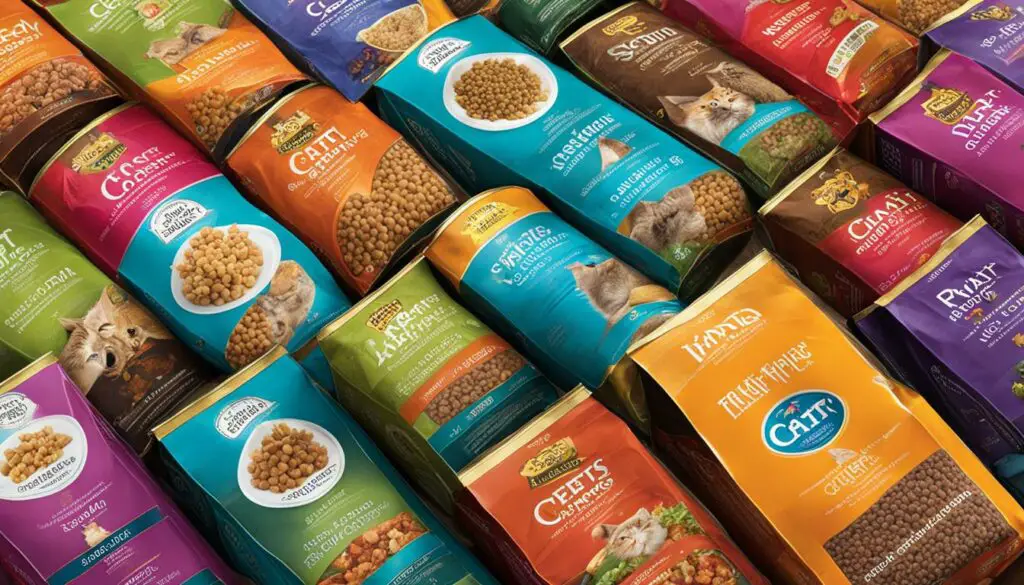
While Hill’s Science Diet, Royal Canin, Purina Pro Plan, and Blue Buffalo are highly recommended cat food brands, there are several other options available that also meet the highest quality standards. These brands offer premium ingredients and a wide range of formulas to cater to different life stages and specific health needs of cats. Here are some other reputable cat food brands to consider:
- Purina Pro Plan: Known for its research-backed formulas and a diverse range of options, Purina Pro Plan provides nutritionally balanced meals for cats of all ages and breeds. They offer specialized formulas for various health concerns, including weight management and urinary tract health.
- Merrick Purrfect Bistro: Merrick Purrfect Bistro focuses on providing natural and flavorful diets for cats. Their recipes are made with high-quality proteins, such as chicken, fish, and turkey, and are free from grains, corn, wheat, and soy.
- Farmina: Farmina is a brand that emphasizes the use of fresh and natural ingredients in their cat food products. They offer a wide range of formulas, including grain-free options and specific recipes for kittens, adult cats, and senior cats.
- VetDiet: VetDiet is a brand that works closely with veterinarians to develop specialized diets for cats with specific health concerns. Their formulas are designed to support conditions like urinary tract issues, gastrointestinal problems, and allergies.
- Nature’s Logic: Nature’s Logic offers cat food products that are made with 100% natural ingredients and without synthetic vitamins or minerals. Their formulas are grain-free and packed with animal-based proteins.
- Earthborn Holistic: Earthborn Holistic provides holistic, grain-free cat food options made with high-quality proteins and nutrient-rich fruits and vegetables. They have formulas for different life stages and specific dietary needs.
When choosing the best cat food for your furry friend, consider their nutritional requirements, dietary preferences, and any specific health concerns they may have. Consult with your veterinarian for personalized recommendations and make an informed decision that ensures your cat’s overall well-being.
Importance of Veterinary Consultation
When it comes to choosing the best cat food for your furry friend, consulting with your veterinarian is essential. Your veterinarian knows your cat’s individual needs, health concerns, and dietary requirements. They can provide personalized recommendations and guide you towards the most suitable cat food options.
Veterinarian recommendation is crucial because each cat is unique and may have specific dietary needs or health conditions that require special attention. By consulting with your veterinarian, you can ensure that the cat food you select meets these requirements and supports your cat’s overall health and well-being.
Your veterinarian can also help address any concerns you may have about the controversial topic of grain-free cat food. While grain-free diets may be beneficial for cats with grain allergies, recent research has raised questions about a potential link between grain-free cat food and heart disease. Your veterinarian can provide the necessary guidance to make an informed decision based on your cat’s specific needs.

Conclusion
When it comes to finding the best cat food options for your furry friend, it’s important to consider their nutritional requirements and consult with a veterinarian for personalized recommendations. Meeting your cat’s specific needs is crucial for their overall health and happiness.
Look for cat food brands that carry the AAFCO Nutritional Adequacy Statement, ensuring they provide complete and balanced nutrition. Reputable brands like Hill’s Science Diet, Royal Canin, Purina Pro Plan, and Blue Buffalo are recommended by veterinarians for their high-quality ingredients and research-backed formulas.
Remember that cats require animal-based protein, named ingredients, and should avoid excessive fillers, artificial colors, flavors, and preservatives. It’s also important to consider your cat’s caloric needs, especially if they are indoor or outdoor cats.
Ultimately, the best cat food brand and formula will depend on your cat’s unique requirements. So, don’t hesitate to reach out to your veterinarian for guidance. They can help you make an informed decision and ensure that you’re providing your feline friend with the best nutrition possible.
FAQ
What should I consider when choosing the best cat food?
When choosing cat food, it’s important to consider your cat’s nutritional requirements, look for the AAFCO Nutritional Adequacy Statement on the packaging, and choose high-quality ingredients with no excessive fillers or artificial additives.
What are the specific nutritional requirements of cats?
Cats require higher protein levels and essential nutrients like taurine, vitamin A, arginine, and arachidonic acid. These nutrients are crucial for their overall health and can only be obtained through their diet.
What does the AAFCO Nutritional Adequacy Statement mean?
The AAFCO Nutritional Adequacy Statement on cat food packaging ensures that the food is a complete and balanced source of nutrition for your cat’s specific life stage. It guarantees that the food meets the nutritional standards set by the Association of American Feed Control Officials.
What are the different types of cat food available?
There are wet cat food and dry cat food options. Wet cat food has a higher moisture content and promotes hydration, while dry cat food is convenient and aids in reducing tartar buildup.
What ingredients should I look for in cat food?
It’s important to choose cat food with high-quality, named animal-based protein sources like chicken or salmon. Avoid cat foods with excessive fillers like corn, wheat, or soy, and look for options that are free from artificial colors, flavors, and preservatives.
How many calories does my cat need?
The caloric needs of cats vary based on their age, activity level, and whether they are indoor or outdoor cats. A general guideline is around 60 calories per kilogram per day for a house cat with little activity, around 45 calories per kilogram per day for a senior cat, and around 70 calories per kilogram per day for an active young kitten.
What are some reputable cat food brands recommended by veterinarians?
Some reputable cat food brands recommended by veterinarians include Hill’s Science Diet, Royal Canin, Purina Pro Plan, and Blue Buffalo. These brands offer high-quality ingredients and a range of options to meet specific dietary needs.
What is the best cat food for indoor cats?
Cat food specifically formulated for indoor cats can help maintain a healthy weight and minimize hairball issues. Some recommended options for indoor cats include Blue Buffalo Tastefuls Indoor, IAMS ProActive Health Indoor Weight Control & Hairball Care, and Purina ONE +Plus Indoor Advantage.
Is grain-free cat food safe for cats?
While grain-free cat food may be beneficial for cats with grain allergies, there have been concerns about a potential link to heart disease in some cats. It is best to consult with your veterinarian to make an informed decision based on your cat’s specific needs.
Are there specialized cat food brands for specific health needs?
Yes, Hill’s Prescription Diet offers specialized formulas to address specific health concerns such as sensitive stomachs, urinary tract issues, and weight management. These brands adhere to high-quality standards and have scientific research backing their formulas.
Are there other recommended cat food brands?
Other highly recommended cat food brands include Purina Pro Plan, Merrick Purrfect Bistro, Farmina, VetDiet, Nature’s Logic, and Earthborn Holistic. These brands offer premium ingredients, specific formulas for different life stages and health needs, and a commitment to cat health and wellness.
Why is veterinary consultation important when choosing cat food?
Veterinary consultation is important because a veterinarian can provide personalized recommendations based on your cat’s specific needs and health conditions. They can help you choose the best cat food brand and formula for your cat’s overall health and happiness.

